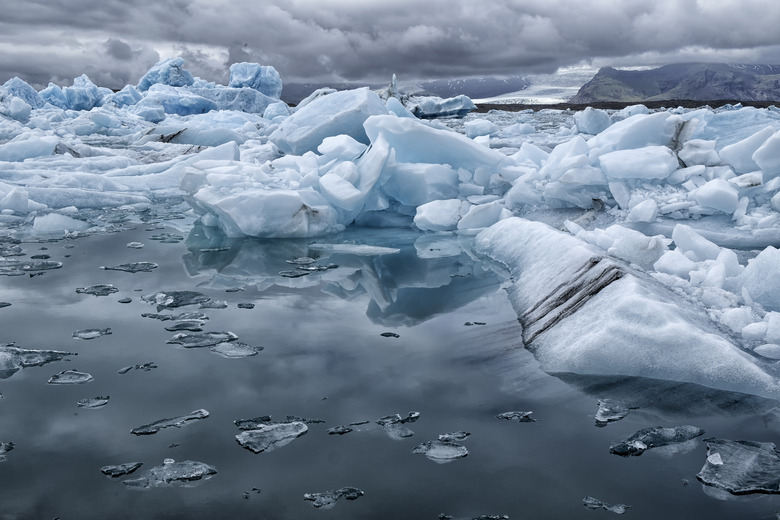What Happens To The Temperature Of Ice As It Melts?
If the ambient temperature around a piece of ice increases, the temperature of the ice will increase as well. However, this steady increase in temperature stops as soon as the ice reaches its melting point. At this point, the ice undergoes a change of state and turns into liquid water, and its temperature won't change until all of it has melted. You can test this with a simple experiment. Leave a cup of ice cubes in a hot car and monitor the temperature with a thermometer. You'll find that the icy water remains at a frosty 32 degrees Fahrenheit (0 degrees Celsius) until all of it has melted. When that happens, you'll notice a quick temperature rise as the water continues to absorb heat from the inside of the car.
TL;DR (Too Long; Didn't Read)
When you heat ice, its temperature rises, but as soon as the ice starts to melt, the temperature stays constant until all the ice has melted. This happens because all the heat energy goes into breaking the bonds of the ice's crystal lattice structure.
Phase Changes Consume Energy
Phase Changes Consume Energy
When you heat ice, the individual molecules gain kinetic energy, but until the temperature reaches the melting point, they don't have energy to break the bonds that hold them in a crystal structure. They vibrate more quickly within their confines as you add heat, and the temperature of the ice goes up. At a critical point – the melting point – they acquire enough energy to break free. When that happens, all the heat energy added to the ice is absorbed by H2O molecules changing phase. There's nothing left to increase the kinetic energy of the molecules in the liquid state until all the bonds holding the molecules in a crystal structure have been broken. Consequently, the temperature remains constant until all the ice has melted.
The same thing happens when you heat water to the boiling point. The water will heat until the temperature reaches 212 F (100 C), but it won't get any hotter until it has all turned to steam. As long as liquid water remains in a boiling pan, the temperature of the water is 212 F, no matter how hot the flame underneath it is.
An Equilibrium Exists at the Melting Point
An Equilibrium Exists at the Melting Point
You might wonder why water that has melted won't get any hotter as long as there is ice in it. First of all, that statement isn't quite accurate. If you heat a a large pan full of water that contains a single ice cube, the water far from the ice will begin to heat up, but in the immediate environment of the ice cube, the temperature will remain constant. One way to understand why this happens is to realize that, while some of the ice is melting, some of the water around the ice is re-freezing. This creates an equilibrium state that helps maintain the temperature constant. As more and more ice melts, the rate of melting increases, but the temperature doesn't go up until all the ice is gone.
Add More Heat or Some Pressure
Add More Heat or Some Pressure
It's possible to create a more-or-less linear temperature rise if you add enough heat. For example, put a pan of ice over a bonfire and record the temperature. You probably won't notice much of a lag at the melting point because the amount of heat affects the rate of melting. If you add enough heat, the ice can melt more or less spontaneously.
If you're boiling water, you can raise the temperature of the liquid still in the pan by adding pressure. One way to do this is to confine the steam in an enclosed space. By doing so, you make it more difficult for molecules to change phase, and they will stay in the liquid state while the water temperature rises past the boiling point. This is the idea behind pressure cookers.
Cite This Article
MLA
Deziel, Chris. "What Happens To The Temperature Of Ice As It Melts?" sciencing.com, https://www.sciencing.com/happens-temperature-ice-melts-8432055/. 27 April 2018.
APA
Deziel, Chris. (2018, April 27). What Happens To The Temperature Of Ice As It Melts?. sciencing.com. Retrieved from https://www.sciencing.com/happens-temperature-ice-melts-8432055/
Chicago
Deziel, Chris. What Happens To The Temperature Of Ice As It Melts? last modified March 24, 2022. https://www.sciencing.com/happens-temperature-ice-melts-8432055/
